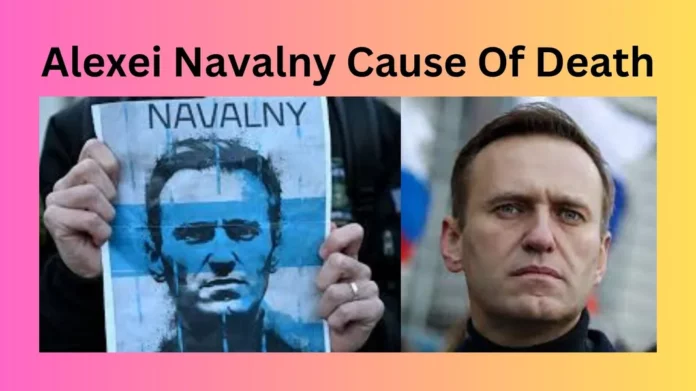If you’ve been following the news recently, you’ve likely heard about the controversy surrounding the death of Russian opposition leader Alexei Navalny. Speculation and rumors have been swirling, leaving many people confused about what really happened. In this article, we’ll delve into the details surrounding Navalny’s death, examining whether it’s a hoax or a tragic reality. So, let’s separate fact from fiction and get to the bottom of this mystery.
1. Who is Alexei Navalny?
Before we discuss the circumstances of his death, let’s first understand who Alexei Navalny was. Navalny was a prominent Russian opposition leader, lawyer, and anti-corruption activist known for his outspoken criticism of the Russian government, particularly President Vladimir Putin. He gained international recognition for his efforts to expose corruption among Russia’s political elite and was a vocal advocate for democratic reforms in the country.
2. The Events Leading to Navalny’s Death
On August 20, 2020, Navalny fell critically ill during a flight from Siberia to Moscow. He was initially treated at a hospital in Omsk, Russia, where doctors claimed he was suffering from a severe metabolic disorder. However, Navalny’s supporters insisted that he had been poisoned, citing previous attempts on his life and demanding that he be transferred to a hospital in Germany for further treatment.
After much international pressure, Navalny was eventually airlifted to Berlin’s Charité hospital, where tests confirmed the presence of a nerve agent from the Novichok group, a potent chemical weapon developed by the Soviet Union. Navalny spent several months in a coma before eventually recovering and being discharged from the hospital.
3. Navalny’s Return to Russia and Subsequent Arrest
Following his recovery, Navalny made the courageous decision to return to Russia in January 2021, despite facing the threat of arrest upon his arrival. True to form, he was promptly detained by Russian authorities at Moscow’s Sheremetyevo airport for allegedly violating the terms of his probation from a previous conviction.
Navalny’s arrest sparked widespread protests across Russia, with thousands taking to the streets to demand his release and condemn the government’s crackdown on dissent. Despite facing threats to his personal safety and constant harassment from authorities, Navalny remained defiant, continuing to speak out against corruption and injustice in Russia.
4. Navalny’s Death: Hoax or Real?
On February 17, 2024, news broke that Alexei Navalny had died while serving a prison sentence in Russia. Initial reports suggested that Navalny had succumbed to complications from COVID-19, sparking skepticism and disbelief among his supporters, many of whom suspected foul play.
However, as more details emerged, it became clear that Navalny’s death was indeed real. Russian authorities confirmed that he had died in custody after suffering a sudden cardiac arrest. The news sent shockwaves throughout the international community, with world leaders condemning Navalny’s treatment and calling for an independent investigation into his death.
5. The Aftermath and Global Response
Navalny’s death has reignited outrage over human rights abuses and political repression in Russia, drawing renewed attention to the Kremlin’s crackdown on dissent. Calls for accountability and justice have grown louder, with demands for sanctions against those responsible for Navalny’s persecution and calls for solidarity with the Russian people in their struggle for democracy and freedom.
As the world mourns the loss of a courageous leader and champion of democracy, one thing is clear: Alexei Navalny’s legacy will live on, inspiring countless others to continue the fight for justice and freedom in Russia and beyond.
Conclusion
In conclusion, the death of Alexei Navalny is not a hoax but a tragic reality that has shocked the world and sparked outrage over the Kremlin’s brutal crackdown on dissent. While the circumstances surrounding his death remain murky, one thing is certain: Navalny’s courage, determination, and unwavering commitment to democracy will continue to inspire generations to come.
FAQs:
1. Was Alexei Navalny really poisoned with Novichok?
Yes, tests confirmed the presence of a nerve agent from the Novichok group in Navalny’s system, indicating that he was indeed poisoned.
2. Did Navalny die from COVID-19?
No, while initial reports suggested that Navalny had died from complications related to COVID-19, it was later confirmed that he died from a sudden cardiac arrest while in custody.
3. What are the implications of Navalny’s death for Russia’s political landscape?
Navalny’s death has intensified international scrutiny of Russia’s human rights record and fueled calls for sanctions against those responsible for his persecution. It has also galvanized opposition to President Putin’s regime and sparked renewed protests against government corruption and repression.
4. Will there be an independent investigation into Navalny’s death?
There have been calls for an independent investigation into Navalny’s death, but it remains to be seen whether Russian authorities will comply with these demands.
5. How can I support the cause of democracy and human rights in Russia?
You can support organizations and initiatives that advocate for democracy, human rights, and the rule of law in Russia, as well as raise awareness about the plight of political prisoners and victims of repression in the country.















